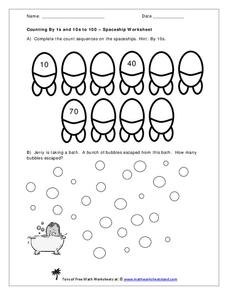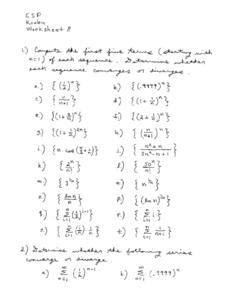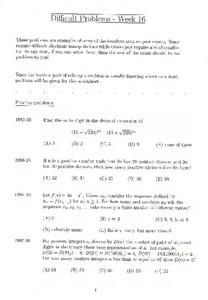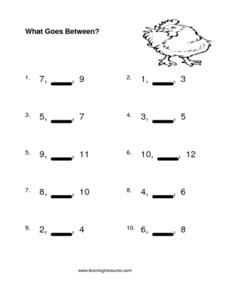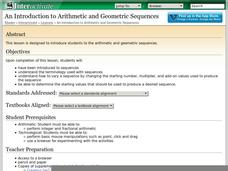Curated OER
Fraction and Decimal Ordering
Ordering numbers just got physical! Learners practice putting numbers in sequence, both in fraction and decimal form. To begin, they line up in birthday order and discuss the difference between ascending and descending. They are then...
Curated OER
Story Structure Slide Show
Analyzing the sequence of actions in dramatic stories leads to deeper comprehension of story structure. The class identifies the main actions in each section of a story and develops frozen tableau's for the identified actions of the...
Curated OER
Counting Forward
Practice counting on from a number using these three sequence starters. Arranged in order of increasing difficulty, the first sequence begins at 5 and has learners add 9 numbers. The answers are written below each sequence, so they...
Curated OER
I Can Use a Worm to Count
Kindergarteners use worms, puppets or other props to practice counting to 100. First, they listen to a read aloud of Count Worms by Roger Hargeaves. A worm pattern is used to count to 100, with each segment of the worm...
Weston Wood
Joseph Had a Little Overcoat
Create a cross-curricular learning experience based on the children's book Joseph Had a Little Overcoat with this collection of learning activities. Starting with a class reading of the story, children go on to learn about the...
Curated OER
Skip Counting By Hundreds
There are 6 different number sequences for learners to complete. Each contains missing number. They skip count by hundreds to determine which number will best fill in the blank.
Guam Community College
Joseph Had a Little Overcoat
Spruce up a class reading of the children's book Joseph Had a Little Overcoat by Simms Taback with this fun series of activities. Starting with a list of reading comprehension questions and key vocabulary to address during a teacher...
Curated OER
Oral Presentation
Practice public speaking in this oral presentation lesson plan. Middle schoolers list the characteristics of a powerful speaker. They watch a video of two speakers, compare them and discuss the qualities of a good speech. Afterwards,...
Curated OER
Counting Practice
Young counters practice their skills in these two visual problems. First, they examine a number sequence beginning at 10 with a few filled in. They must count by 10s to fill in the rest of the pattern. Next, learners count the bubbles...
Curated OER
Counting by 1s Puzzle Worksheet
This dog is apparently quite upset that he is separated from his bone; can your learners use their counting skills to guide him back to it? The hundreds chart just took a fun twist! Scholars start at one on the bottom of the...
Bowland
Patchwork Cushions
Find out if there are enough squares. Given diagrams for the first four figures in a sequence, pupils try to determine the next figure. Individuals find the number of square and triangle pieces of fabric that are required to make...
EngageNY
Dividing by (x – a) and (x + a)
Patterns in math emerge from seemingly random places. Learners explore the patterns for factoring the sum and differences of perfect roots. Analyzing these patterns helps young mathematicians develop the polynomial identities.
CK-12 Foundation
Sums of Geometric Series
Geometric series either get bigger or approach a single number. So, how do you know which it is? An interactive presents three different geometric series with varying common ratios. With the aid of patterns, pupils determine values of r...
Curated OER
Sequence Problems
In this sequence worksheet, students compute the first five terms of a sequence and determine whether each sequence converges or diverges. They determine the limits of given sequences. This two-page worksheet contains approximately 45...
Curated OER
Difficulty Problems - Week 16 (Sequence)
In this sequence worksheet, students determine the number of positive integers under given conditions, they determine the number of unit cubes in a plane, find decimal expansion, and solve sequences. This two-page worksheet contains...
Curated OER
Sequence Problem
In this sequence problem worksheet, students read a story problem and determine the next number in a given sequence. This one-page worksheet contains one multi-step problem.
Curated OER
Discussion Sheet 5: Limits and Sequences
For this limits and sequences worksheet, students determine the limits of given sequences and convert triple integrals into rectangular and cylindrical coordinates. They sketch graphs in a three dimensional space. This one-page...
Curated OER
Extra Sequence Problems
In this sequence worksheet, students determine the nth term of given sequences. This one-page worksheet contains fifteen sequence problems.
Curated OER
What Goes Between? Number Sequences
In this lower elementary math worksheet, students fill the blank in the middle of two numbers with the number that completes the sequences. They see 4,___.6; and fill in the blank. They see a black line picture of a chicken on the page.
Curated OER
Numbers on a Number Line and Math Patterns
In this number line instructional activity, students solve 25 problems in which values on a number line are calculated. Students also figure out math patterns and continue the sequence. This is an online activity that can be done on paper.
Curated OER
Functions, Sequences, Limits
In this function activity, students determine the limit of a given sequence and given functions. They sketch paragraphs. This three-page activity contains 40 problems.
Curated OER
Body Sequencing
Fifth graders listen to a story told by their teacher. They have cards of all of the events in the story. They must "jump" into the correct order of events.
Curated OER
U Boat Hunt
Students recognize patterns and sequences in numbers. In this geometry instructional activity, students create rules to define the sequences and patterns they obsere. They translate coded messages as they dicuss navigational terms.
Shodor Education Foundation
An Introduction to Arithmetic and Geometric Sequences
Help your class look for patterns as they create their own arithmetic and geometric sequences. Engage learners with an introductory discussion on sequences and use the applet to let them explore how sequences are formed. Teachers might...








